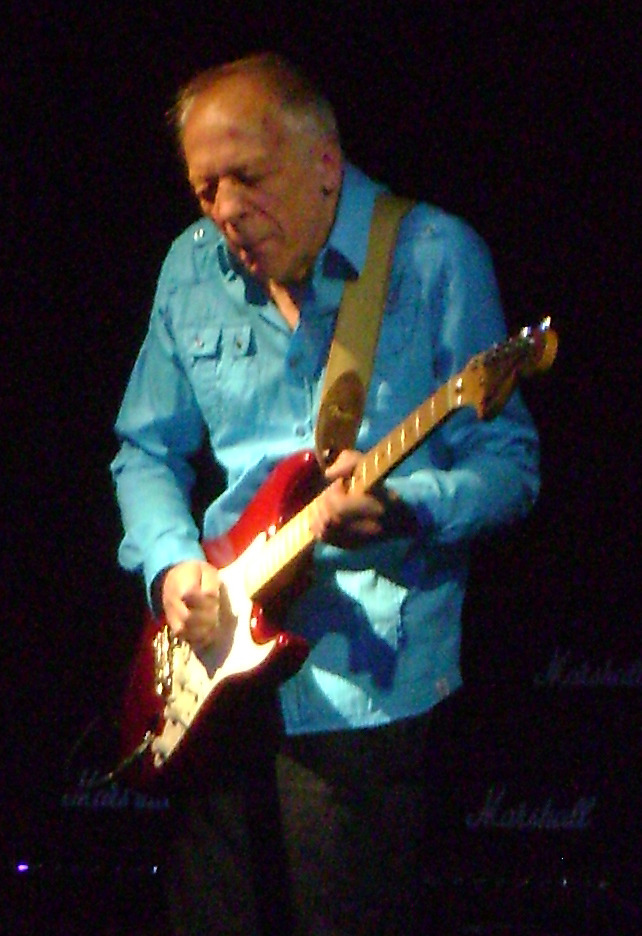 RF: Did you feel the need to stretch your wings, so to speak, from “Procol Harum?†What led to leaving?
RF: Did you feel the need to stretch your wings, so to speak, from “Procol Harum?†What led to leaving?
Trower: I was starting to write more and more music, songs, and there wasn’t space for it in “Procol Harum,†so I had to get on with my own thing.
RF: Why is “Bridge of Sighs,â€which is your second solo album, a landmark recording? I got a re-mastered version with  John Peel’s BBC radio sessions on it (the bonus tracks) Why does it hold up as such a classic? Well, in my opinion, I’m sure in almost everyone’s opinion.
Trower: I think it was definitely a coming together, it was kind of like of peaking of everybody’s talents that were involved. That was the thing , the writing was very strong: The recording sound was sort of huge for that time. Everybody had a big part of it, and obviously the main thing is the songs and James Dewar’s vocals.
RF: Oh yes, fantastic vocalist, and Reg Isidore on drums had just an incredible sound on the recording, too.
Trower: He has a lovely feel, really lovely feel.
RF: I’m actually reading a book about Geoff Emerick and his production of The Beatles(“Here, There and Everywhereâ€) How was it working with him?
Trower: It was great.
RF: You wrote in the liner notes of him miking  the instruments in different areas of the studio?
Trower: Yeah, I think he may be the first guy to  record“loud guitar†well and create that huge sound. He was and is a wonderful engineer.
RF: The band version with Dewar and Isidore,What made it so special? Was there any difference playing with Reg Isidore  or Bill Lordan ( Trower’s two drummers at different times)?
Trower: Yeah, there’s a quite a bit of difference. Bill was more technically gifted, if you like; he was quite more complex rhythmically. Isidore was a soulful drummer with a unique sound.
RF: Was it true that the album was recorded in two weeks?
Trower: Yeah, I think it was 17 days or something like that. A few of the tunes, we were already playing live, you see, so they were more or less complete.
RF: Also, when I’m looking inside the CD, was that picture taken by London Bridge?
Trower: Yes, on the Thames.
RF: Yes, a great shot, just a wonderful picture.
Trower: I think it was a TV show we were miming to.
RF: Were they great guys to work with? Were they great people, too?
Trower: Absolutely; they were really wonderful.
RF: That’s a nice combination, then
RF: Did you ever visit the Bridge of Sighs in Venice?
Trower: No, I never did.
RF: You did a big Shea Stadium show in 1976 with Jethro Tull and Rory Gallagher?
Trower: That’s right.
RF: Before that, I guess The Beatles and Grand Funk Railroad were the only  bands that had played Shea, which no longer exists. You have Citi Field, the new home of the Mets; but what was that experience like playing in this giant stadium ?
Trower: You’ve got to remember that we were already used to playing big places. For instance, when I was in “Procol Harum,†we did the Isle of Wight Festival (in England), which was huge. It wasn’t that much of an eye opener as it were. It was great; I remember it being a great night.
RF: When watching you play at B.B. Kings, I just have the impression that you really enjoy playing a lot. Now does it ever grow old? You really seem to be relishing it, and are  just very happy in the moment.
Trower: Yeah, that’s right. That’s the thing that keeps the whole machine running, the fact that I love to play so much
RF: Early influences on guitar: Were they many? A few?
Trower: Well, really, the first big influence on me was Scotty Moore (Elvis Presley’s guitarist )That’s really why I wanted to have a guitar in the first place, because I loved this playing.

Another fine interview. Trower’s a class act. Those bonus BBC tracks on the re-issue of “Bridge Of Sighs” are quite strong and, IMHO, worthy of a separate release. Even though BOS is considered his classic, I’ve always been partial to “Long Misty Days” (maybe because it’s the first Trower album I owned), which tends to be somewhat overlooked. It’s quite strong, so give it a listen, if you haven’t already.